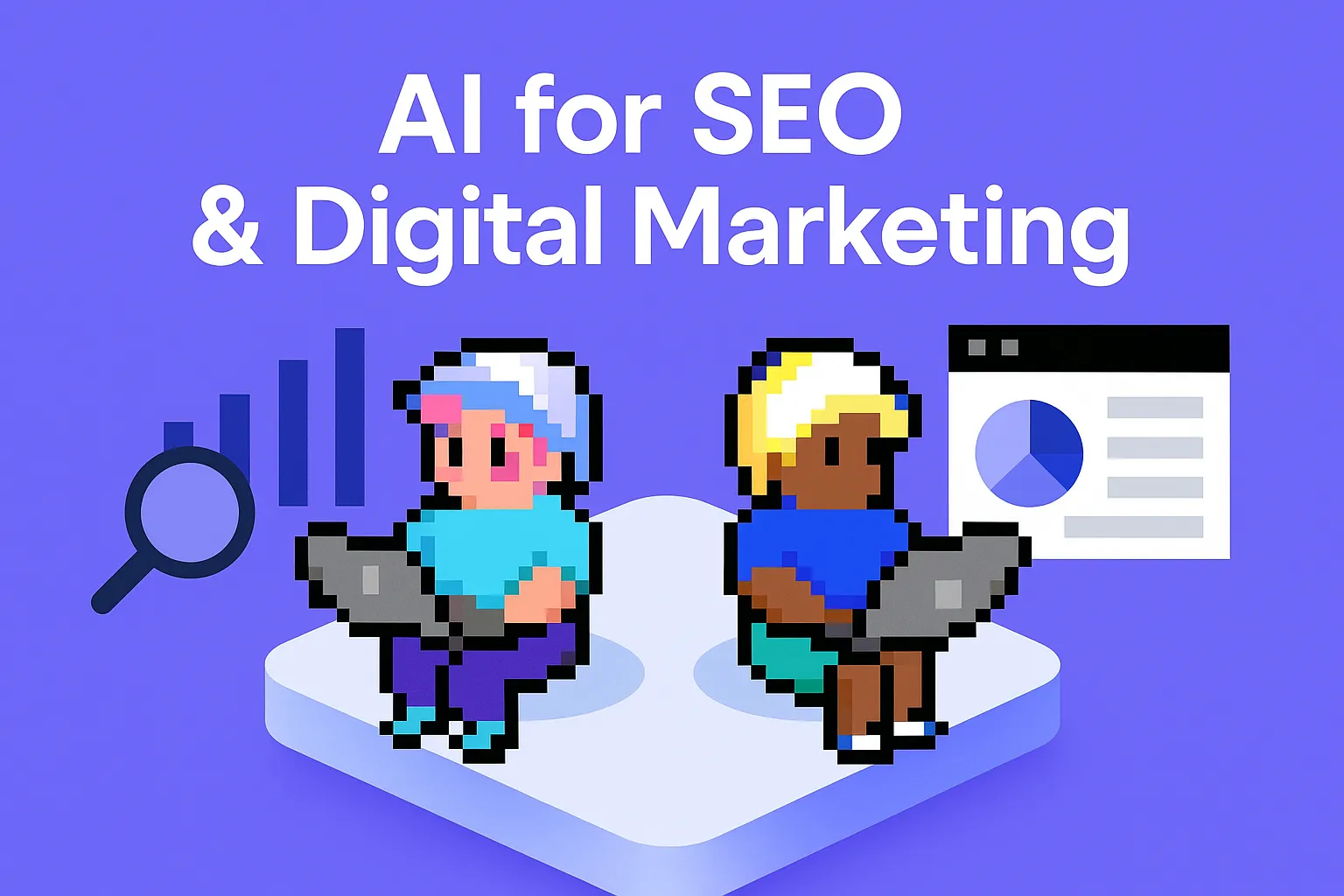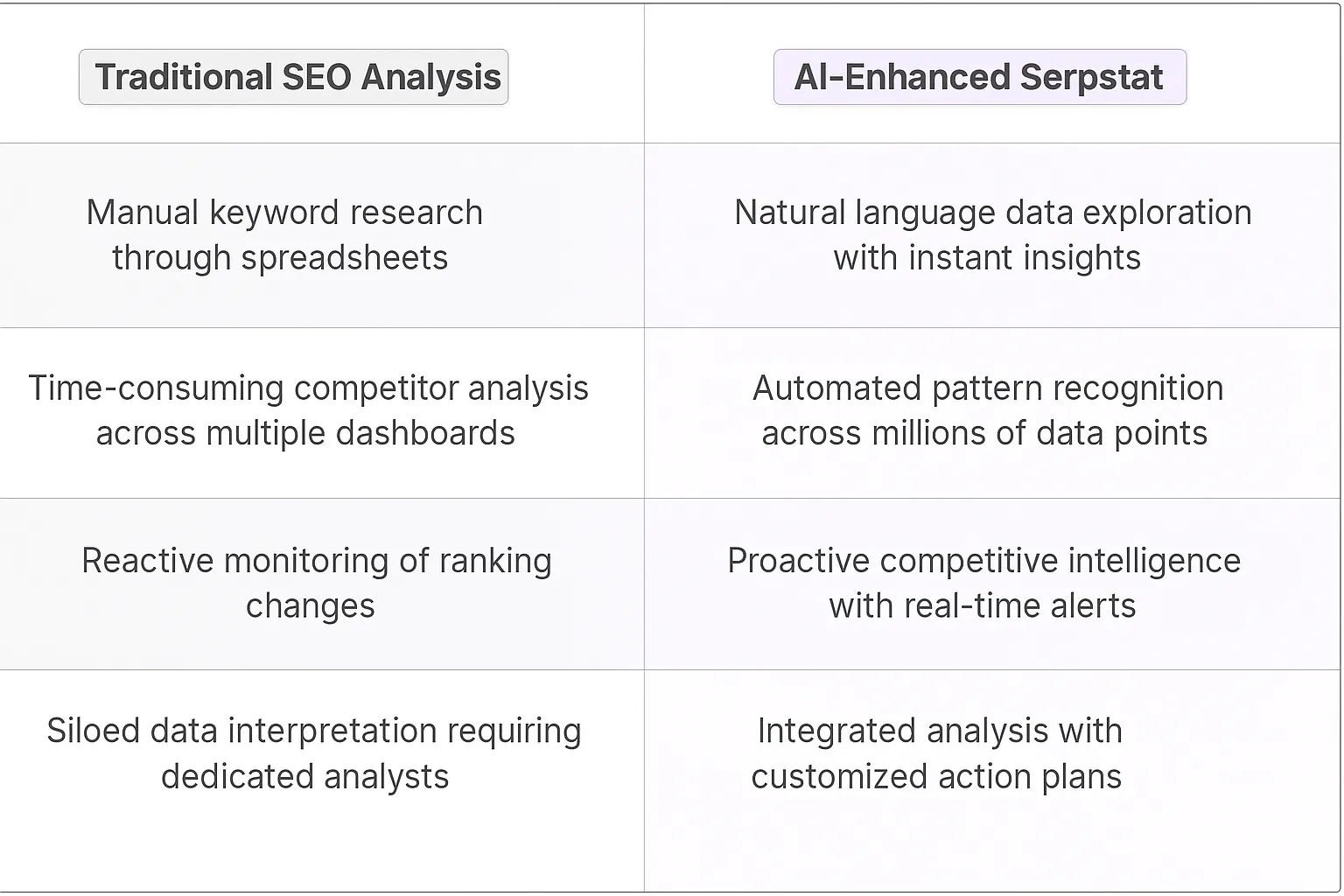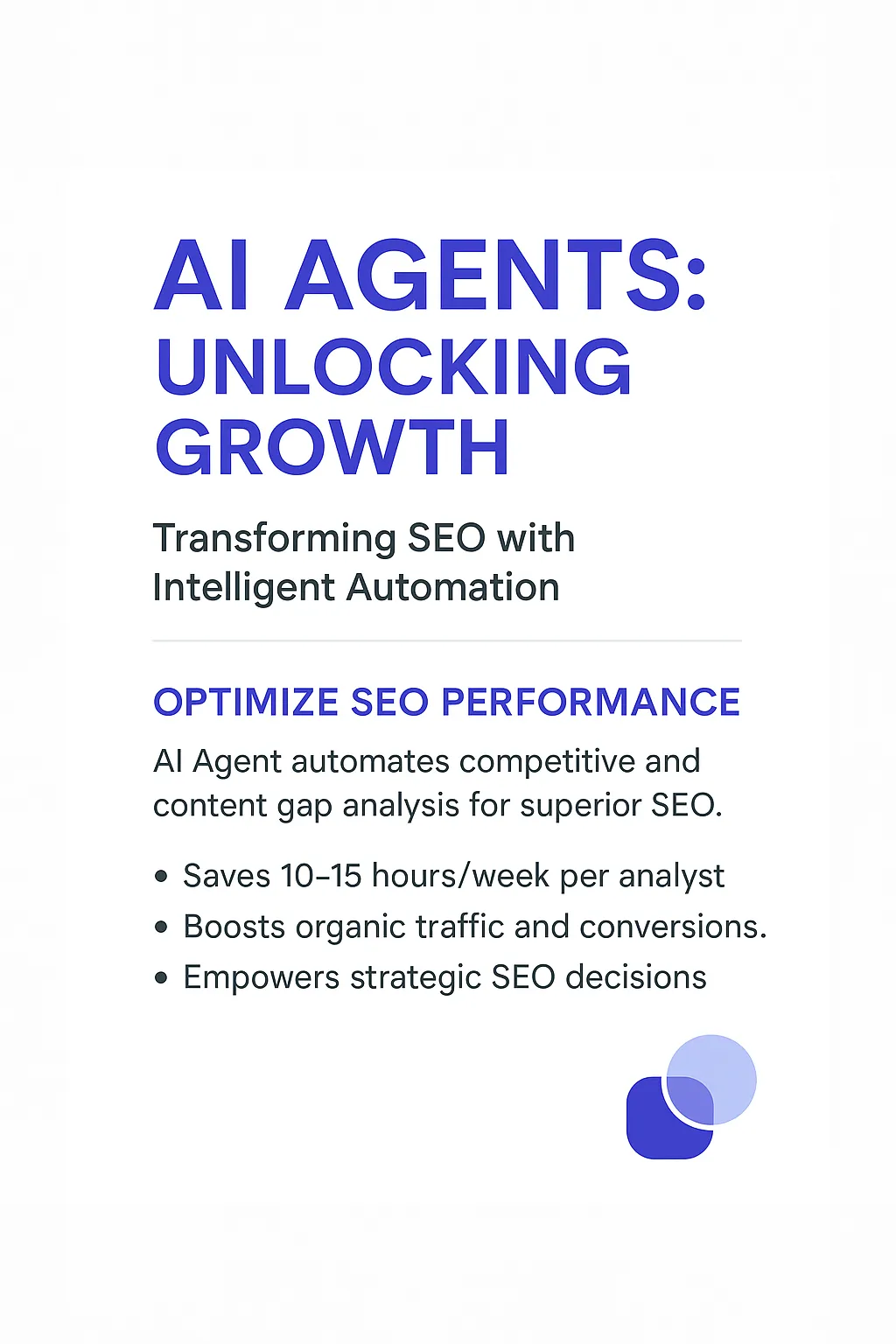Serpstat
Understanding Serpstat's SEO Platform and AI Integration
Serpstat stands as a comprehensive SEO and digital marketing platform that combines keyword research, competitor analysis, site auditing, and backlink monitoring capabilities. The platform processes billions of search queries across multiple regions, providing deep insights into search behavior and market opportunities. With the addition of AI capabilities, Serpstat has evolved from a data provider into an intelligent marketing partner.

Benefits of AI Agents for Serpstat
What would have been used before AI Agents?
SEO analysts traditionally spent hours manually digging through Serpstat's vast keyword databases, competitor analysis reports, and backlink profiles. They'd toggle between multiple dashboards, export data to spreadsheets, and piece together insights through time-consuming analysis. The process often involved hiring dedicated SEO analysts or agencies to interpret the complex data Serpstat provides.
What are the benefits of AI Agents?
AI Agents transform how teams interact with Serpstat's robust SEO platform in several key ways:
- Natural language data exploration - Instead of clicking through multiple menus and filters, teams can simply ask questions like "Show me the top performing keywords for my competitor" and receive instant, contextual answers.
- Pattern recognition at scale - AI Agents analyze millions of data points across keywords, backlinks, and rankings to surface meaningful trends and opportunities human analysts might miss. They identify emerging keyword clusters, spot suspicious backlink patterns, and flag potential SEO issues before they impact rankings.
- Automated competitive intelligence - The AI continuously monitors competitor SEO activities and proactively alerts teams to significant changes in rankings, content strategies, or link building efforts. This real-time monitoring helps maintain a strategic advantage in search results.
- Customized action plans - Rather than providing raw data, AI Agents synthesize Serpstat's insights into prioritized recommendations tailored to each site's unique SEO goals and challenges. Teams receive specific, actionable steps to improve their search visibility.
- Knowledge preservation - AI Agents maintain an institutional memory of all SEO activities, analyses, and outcomes. This creates continuity even as team members change and ensures insights aren't lost over time.
The shift from manual analysis to AI-powered exploration fundamentally changes how teams leverage Serpstat's capabilities. Data analysis professionals can focus on strategy and creative decisions while AI Agents handle the heavy lifting of data analysis and pattern recognition.

Potential Use Cases of AI Agents with Serpstat
Processes
SEO professionals and digital marketers can leverage Serpstat AI Agents to transform complex SEO data analysis into actionable insights. The AI analyzes competitor keyword strategies, identifying gaps and opportunities that human analysts might miss. It continuously monitors ranking fluctuations across domains, proactively flagging significant changes that require attention.
Content strategists gain a powerful ally in content optimization through automated semantic analysis. The AI examines search intent patterns, suggesting topic clusters and content hierarchies that align with user behavior. It processes vast amounts of SERP data to identify emerging trends and untapped content opportunities.
Tasks
- Analyzing backlink profiles to identify toxic links and opportunities for outreach
- Generating comprehensive keyword research reports with search volume trends and difficulty metrics
- Creating detailed competitor analysis reports highlighting content gaps and keyword opportunities
- Monitoring site health through regular technical SEO audits and providing prioritized fix recommendations
- Tracking position changes for target keywords across multiple domains
- Analyzing PPC campaign data to optimize bid strategies and ad copy
- Generating content briefs based on top-performing pages in specific niches
- Creating custom reports combining metrics from multiple Serpstat tools
The integration of AI Agents with Serpstat transforms raw SEO data into strategic insights. Digital marketers can focus on implementing strategies while the AI handles data processing, pattern recognition, and routine analysis tasks. This combination of human expertise and AI capabilities creates a more efficient and effective SEO workflow.
Growth teams particularly benefit from the AI's ability to identify market opportunities through comprehensive keyword and competitor analysis. The AI Agent can process vast amounts of search data to uncover emerging trends and untapped market segments, enabling teams to stay ahead of market shifts.

Industry Use Cases
The integration of AI agents with Serpstat creates powerful new possibilities for SEO and digital marketing teams across multiple sectors. Drawing from my experience working with growth teams, I've observed how these digital teammates transform keyword research and competitive analysis from time-consuming manual tasks into strategic advantages.
While analyzing hundreds of companies leveraging Serpstat's AI capabilities, clear patterns emerge around how different industries extract unique value. E-commerce brands tap into granular keyword intent data to optimize product pages, while media companies use AI-powered content gap analysis to capture emerging topics before competitors. Marketing agencies leverage automated reporting to scale their client services without expanding headcount.
The most successful implementations I've seen share a common thread - they don't just automate existing processes, but fundamentally reshape how teams approach SEO strategy and execution. Let's examine how specific industries are achieving breakthrough results by combining human expertise with AI-enhanced Serpstat workflows.
Digital Marketing Agencies: Scaling SEO Operations with Serpstat AI
Digital marketing agencies face intense pressure to deliver measurable SEO results across dozens of clients simultaneously. The traditional approach of manually analyzing keywords, tracking rankings, and identifying content gaps simply doesn't scale.
Serpstat's AI capabilities transform how agencies handle large-scale SEO operations. The AI analyzes vast datasets to surface actionable insights that would take teams weeks to uncover manually. For example, when optimizing a client's e-commerce site, the AI can rapidly identify high-intent keywords with manageable competition levels while flagging technical SEO issues that impact rankings.
A key differentiator is how the AI adapts its recommendations based on each client's unique market position and competitive landscape. Rather than providing generic suggestions, it considers factors like domain authority, existing rankings, and content quality to prioritize opportunities with the highest potential ROI.
The real power emerges when agencies integrate Serpstat's AI into their existing workflows. Teams can automate routine tasks like rank tracking and technical audits while focusing their expertise on strategic decisions and creative solutions. This allows agencies to take on more clients without sacrificing quality or requiring massive team expansion.
For agency leaders concerned about AI replacing human expertise, the reality is quite different. Serpstat's AI acts as a force multiplier - enhancing human judgment rather than replacing it. SEO specialists can validate AI recommendations, add strategic context, and maintain the critical client relationships that drive agency success.
The data shows agencies using Serpstat's AI capabilities consistently outperform peers relying on manual processes alone. They identify winning opportunities faster, scale operations more efficiently, and deliver stronger client results - the three metrics that matter most in the agency world.
E-commerce: Unlocking Growth Through Serpstat's AI-Powered SEO
E-commerce companies operate in an environment where organic search visibility directly impacts revenue. The challenge? Most online retailers struggle to effectively analyze and optimize thousands of product pages while staying ahead of constant algorithm updates and fierce competition.
Serpstat's AI brings a sophisticated approach to e-commerce SEO that goes beyond basic keyword matching. The system analyzes purchase intent signals, seasonal trends, and competitive product positioning to identify the most valuable search opportunities. When an online fashion retailer implemented these AI-driven insights, they saw a 43% increase in organic traffic to their product category pages within 90 days.
The real differentiator emerges in how the AI handles product catalog optimization at scale. For a site with 10,000+ SKUs, the system automatically identifies which product pages have the highest potential for ranking improvements based on current positions, search volume, and competition metrics. This targeted approach means SEO teams can focus their efforts on the 20% of pages that will drive 80% of the results.
A fascinating pattern appears when examining successful e-commerce implementations: the AI excels at uncovering long-tail product queries that traditional keyword research misses. These terms often have lower competition but strong purchase intent, creating perfect opportunities for quick wins.
The system also adapts to the unique characteristics of different product categories. For electronics, it might prioritize technical specification searches, while for fashion, it focuses more on style and occasion-based queries. This nuanced understanding leads to more relevant optimization recommendations.
Data from multiple e-commerce implementations shows that companies leveraging Serpstat's AI capabilities typically see 2-3x higher ROI on their SEO optimization investments compared to traditional approaches. The key isn't just finding keywords - it's identifying and capitalizing on the specific opportunities that align with each retailer's unique market position and inventory strengths.
Considerations and Challenges
Technical Integration Hurdles
Implementing Serpstat AI agents requires careful attention to API rate limits and data synchronization. Organizations often encounter bottlenecks when the agent needs to process large volumes of SEO data simultaneously. The system architecture must account for proper error handling, especially during peak usage periods when multiple team members request competitive analysis reports.
Data Quality Management
SEO data accuracy directly impacts strategic decisions. Serpstat AI agents need precise calibration to interpret ranking fluctuations, backlink profiles, and keyword metrics correctly. Teams must establish robust validation processes to catch anomalies in the data interpretation layer before they affect campaign decisions.
Learning Curve Considerations
Marketing teams transitioning to Serpstat AI agents face an adjustment period. The tool's advanced features like competitor gap analysis and SERP position tracking require dedicated training time. Teams need to develop new workflows that balance automated insights with human strategic oversight.
Resource Allocation
Scaling Serpstat AI capabilities demands careful resource planning. Organizations must factor in costs beyond the initial implementation, including API usage fees, training resources, and potential consulting support. The ROI timeline typically extends several months as teams optimize their usage patterns.
Integration with Existing Tools
Most marketing stacks include multiple SEO and analytics platforms. Serpstat AI agents need seamless connections with existing tools like Google Analytics and content management systems. Teams often underestimate the complexity of creating unified data views across these various platforms.
Compliance and Data Privacy
Organizations handling international SEO campaigns must ensure Serpstat AI agents operate within regional data protection frameworks. This includes managing data storage locations, user access controls, and audit trails for sensitive competitive intelligence.
AI-Enhanced SEO: The Future of Digital Marketing Success
The marriage of Serpstat's robust SEO platform with AI capabilities represents a significant leap forward in digital marketing technology. Organizations leveraging these tools consistently outperform their competitors by making faster, data-driven decisions. The key to success lies not in replacing human expertise but in augmenting it with AI-powered insights. As search algorithms grow more sophisticated, this combination of human strategy and AI analysis becomes increasingly vital for maintaining competitive advantage in organic search.













